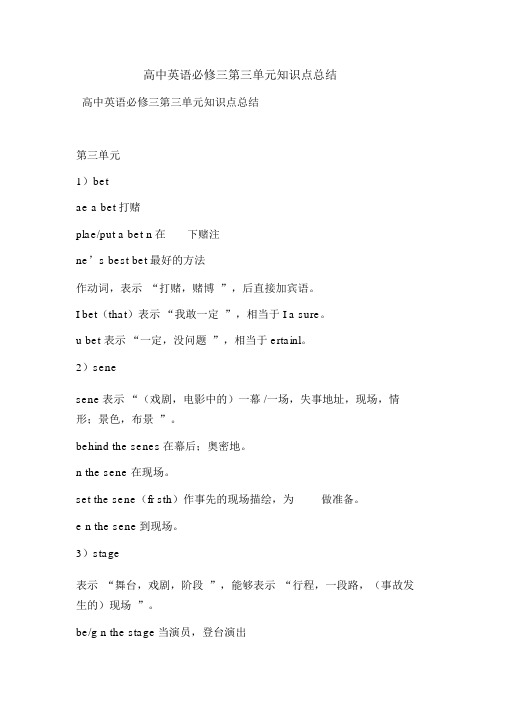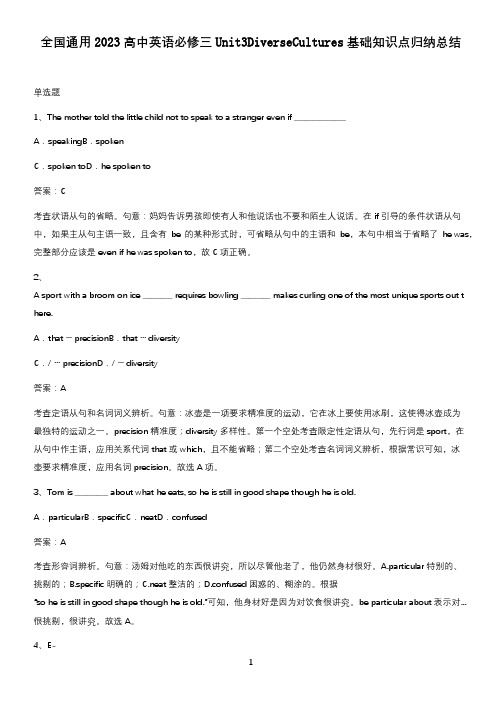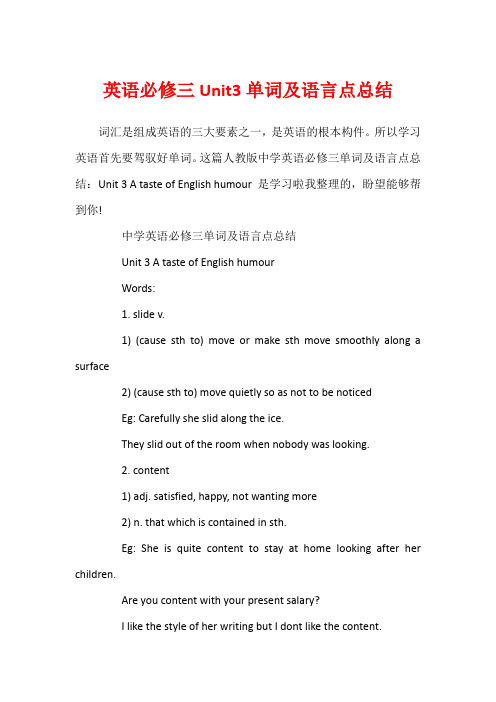【范文】高中英语必修三第三单元知识点总结
高中英语必修三 Unit 3 Diverse Cultures知识点精讲(单词、短语、语法句型)

高中英语必修三 Unit 3 Diverse Cultures知识点精讲(单词、短语、语法句型)重点词汇1.admit (admitted。
admitting)XXX。
XXX。
For example。
"I have to admit that it definitely feels good to be back in the city again." It can also mean to allow someone to enter or join。
as in "If you leave the club。
you will not be admitted back in." Admit is often used with the n "to" or "into"。
and can be followed by a gerund or a noun。
For example。
"Dana admitted to being strict with her children" or "He was admitted into the club."2.occurOccur means to happen or take place。
For example。
"The accident occurred at five o'clock." It can also be used with the n"to" or "that"。
as in "It occurred to me that I had left my keys at home" or "It occurred to him to call his mother."易混辨析Occur。
英语必修三unit3知识点总结

英语必修三unit3知识点总结.doc英语必修三Unit 3知识点总结前言Unit 3作为英语必修三的重要组成部分,涵盖了丰富的语言知识点和文化背景知识。
本总结旨在帮助学生更好地理解和掌握本单元的核心内容。
第一部分:词汇学习1. 核心词汇Adjectives: beautiful, magnificent, unique, mysterious, ancient, traditional, cultural, historicalNouns: civilization, architecture, sculpture, painting, music, literature, philosophy, religionVerbs: admire, explore, create, preserve, appreciate, influence, develop, transform2. 短语搭配Explore the world: 探索世界Appreciate art: 欣赏艺术Influence culture: 影响文化Preserve history: 保护历史Develop skills: 发展技能第二部分:语法重点1. 被动语态被动语态的构成:be + past participle被动语态的使用:当动作的执行者不明确或不重要时2. 定语从句定语从句的引导词:who, whom, whose, which, that定语从句的作用:修饰先行词,提供更多信息3. 现在完成时现在完成时的形式:have/has + past participle现在完成时的用法:表示过去发生的动作对现在造成的影响或结果第三部分:阅读理解1. 文章结构标题:概括文章主题引言:介绍背景信息正文:详细阐述主题结尾:总结全文,提出观点或建议2. 阅读技巧快速阅读:获取文章大意精读:理解细节,分析作者意图推理判断:根据上下文推断词义或作者观点第四部分:写作技巧1. 写作结构引言:提出话题,吸引读者兴趣正文:分段落阐述观点,提供论据结尾:总结全文,提出个人看法或建议2. 写作技巧使用多样的句型和词汇注意段落之间的逻辑关系确保语法正确,拼写无误第五部分:文化背景知识1. 世界文化遗产介绍几个著名的世界文化遗产,如中国的长城,埃及的金字塔等探讨文化遗产对现代社会的影响2. 艺术与文化讨论不同艺术形式如何反映和塑造文化分析艺术与文化之间的关系第六部分:综合运用1. 口语表达练习描述文化遗产和艺术作品讨论文化遗产保护的重要性2. 听力理解听有关文化遗产和艺术的讲座或访谈练习捕捉关键信息,理解主旨大意结语Unit 3的学习不仅要求学生掌握语言知识,更要求学生能够理解和欣赏文化多样性。
高中英语必修三第三单元知识点总结

高中英语必修三第三单元知识点总结《高中英语必修三》第三单元主要涉及以下几个方面的知识点:人教版必修3Unit3 Sharks第一部分知识梳理。
第一节词汇梳理1.scope范围2.urge敦促3.tame驯服4.inferior低等的5.equip装备6.presumably大概7.instinct本能8.adventure冒险第二节短语梳理1.in search of寻找2.get(to)work开始工作3.be equipped with带有4.be inferior to比……差5.feed on以……为食6.look into调查7.result from起因于8.bear in mind牢记第三节语法梳理一、情态动词'would'与过去的情态相比,语义上表推测与提议。
1.表示过去习惯、倾向'most of the shark victims would have been men'2.表示推测,猜测‘the shark may have made a mistake', 'It would be Mr Hansen'3.表示礼貌、委婉的请求,宣布、征求,提议、归因'do you think he would have killed a dog?'二、句式推测的过去式'could/couldn't'做推测用法。
1.结构:主语+谓语+宾语+情态动词+have done2.推测过去是否发生:肯定推测为could/must have done否定推测:以couldn't/can't/mustn't/may not have done,译为‘(发生过)一定没做过/可能没做过/一定不可能做事’。
即:’He may not have survived'(他可能没有活下来); ‘He must have survived'(他一定活下来了)第四节重要内容梳理关于本单元的阅读材料本单元主要围绕大白鲨展开,涉及鲨鱼与人类的关系、鲨鱼袭击人类的原因、鲨鱼相关的科学研究等。
人教版高中英语选择性必修第三册 Unit 3 单元重点小结

单元重点小结
英语
重点单词
1. graph n.图;图表;曲线图
2. melt
vi.& vt.(使)融化;熔化;软化
3. starve vi.& vt.(使)挨饿;饿死→
starvation n.挨饿;饿死
4. ecology
n.生态;生态学
5. release
vt.& n.排放;释放;发布
33. campaign 34. tolerate 容 35. agenda
n.运动;战役 vi.&vt.参加运动;领导运动 vt.忍受;包容;容许→ toleration n.忍受;容忍;宽
n.议程表;议事日程
重点短语
1. have an impact on 2. be trapped in 3. not only...but also... 4. in search of 5. on behalf of 6. be harmful to 7. dozens of 8. in effect 9. be disposed of
本课结束
21. chaos n.混乱;杂乱;紊乱
22. nuclear
adj.原子能的;核能的;原子核的
23. sensitive
adj.敏感的;善解人意的;灵敏的
24. jungle
n.(热带)丛林;密林
25. smog
n.烟雾(烟与雾混合的空气污染物)
26. volume
n.量;体积;(成套书籍中的)一卷
6. carbon
n.碳
7. sustain
vt.维持;遭受;承受住→ sustainable adj.可持续
的;合理利用的
高中英语必修三第三单元知识点总结

高中英语必修三第三单元知识点总结高中英语必修三第三单元知识点总结第三单元1)betae a bet打赌plae/put a bet n在下赌注ne’s best bet最好的方法作动词,表示“打赌,赌博”,后直接加宾语。
I bet(that)表示“我敢一定”,相当于 I a sure。
u bet 表示“一定,没问题”,相当于 ertainl。
2)senesene表示“(戏剧,电影中的)一幕 /一场,失事地址,现场,情形;景色,布景”。
behind the senes在幕后;奥密地。
n the sene 在现场。
set the sene(fr sth)作事先的现场描绘,为做准备。
e n the sene到现场。
3)stage表示“舞台,戏剧,阶段”,能够表示“行程,一段路,(事故发生的)现场”。
be/g n the stage当演员,登台演出set the stage fr sth为某事做准备。
4)tale是可数名词,表示“传说,故事”。
tell its n tale 不言自喻,不言而喻。
)p erit作动词,后接名词或许代词,表示“同意,答应”;也能够表示“使可能”。
后接不定式的复合构造。
后接动名词,不可以直接跟不定式。
分词短语作状语。
后不可以随从句。
perit f sth 认同,容忍。
作名词,表示“同意证,执照,同意”。
6)aunt作名词,表示“表达,报导,原由,账目,户头”。
b/fr all aunts 依据大家所说的。
give an aunt f 表达,报导,说明。
作名词,表示“认为”时,后接复合宾语。
aunt fr 表示“做出解说,致使,是的原由”,还能够表示“占,捕获”。
常有的词组:ut f aunt 不考虑 n all aunts/n ever aunt不论怎样n n aunt决不tae int aunt/tae aunt f对加以考虑,顾及turn t gd aunt 利用7)ealusbe ealus f sb妒忌,生怕某人被别人夺走。
全国通用2023高中英语必修三Unit3DiverseCultures基础知识点归纳总结

全国通用2023高中英语必修三Unit3DiverseCultures基础知识点归纳总结单选题1、The mother told the little child not to speak to a stranger even if ______________A.speakingB.spokenC.spoken toD.he spoken to答案:C考查状语从句的省略。
句意:妈妈告诉男孩即使有人和他说话也不要和陌生人说话。
在if引导的条件状语从句中,如果主从句主语一致,且含有be的某种形式时,可省略从句中的主语和be,本句中相当于省略了he was,完整部分应该是even if he was spoken to,故C项正确。
2、A sport with a broom on ice ________ requires bowling ________ makes curling one of the most unique sports out t here.A.that … precisionB.that … diversityC./ … precisionD./ … diversity答案:A考查定语从句和名词词义辨析。
句意:冰壶是一项要求精准度的运动,它在冰上要使用冰刷,这使得冰壶成为最独特的运动之一。
precision 精准度;diversity 多样性。
第一个空处考查限定性定语从句,先行词是sport,在从句中作主语,应用关系代词that或which,且不能省略;第二个空处考查名词词义辨析,根据常识可知,冰壶要求精准度,应用名词precision。
故选A项。
3、Tom is _________ about what he eats, so he is still in good shape though he is old. A.particularB.specificC.neatD.confused答案:A考查形容词辨析。
英语高一必修三unit3知识点

英语高一必修三unit3知识点第一节:Unit 3知识点之词汇英语的词汇是学习的基础,掌握好词汇是提高语言表达能力的关键。
在高一必修三的Unit 3中,我们将学习到一些重要的词汇。
首先是与“依赖”相关的词汇。
在现代社会,人们总是依赖于各种各样的东西。
例如,“rely on”表示依赖,在句子中常用来表达我们对某人或某物的信任和依靠。
此外,还有与之相关的短语,如“depend on”和“count on”。
其次是“学习”和“教育”的词汇。
学习是我们成长的过程,而教育则是这个过程的推动力。
在这个单元中,我们将学习到一些与学习和教育相关的词汇,比如“educate”表示教育;“knowledge”表示知识;“learn”表示学习;“teach”表示教授等。
接下来是一些描述人的特征的词汇。
在Unit 3中,我们会学习到一些与性格特征和外貌特征相关的词汇。
例如,“optimistic”表示乐观的;“pessimistic”表示悲观的;“shy”表示害羞的;“outgoing”表示外向的;“friendly”表示友好的等。
最后是形容词与副词的比较级和最高级。
在英语中,形容词和副词有比较级和最高级两种形式,用来表示不同程度的差异。
在Unit 3中,我们将会学习到一些形容词和副词的比较级和最高级形式,例如“better”和“best”表示“好”的比较级和最高级。
第二节:Unit 3知识点之语法除了词汇外,语法也是英语学习的重点之一。
在高一必修三的Unit3中,我们将学习到一些重要的语法知识。
首先是不定式。
不定式是一个由动词“to”加上动词原形构成的形式,它可以用作名词、形容词或副词。
例如,“to study”表示“学习”,“to be”表示“是”。
不定式在句子中常用来表示目的、原因、结果等。
其次是虚拟语气。
虚拟语气是用来表示不真实、假设或建议的语气。
在Unit 3中,我们将学习到一些常见的虚拟语气形式。
例如,“If Iwere you, I would…”表示假设,“It's high time that…”表示建议等。
英语必修三Unit3单词及语言点总结

英语必修三Unit3单词及语言点总结词汇是组成英语的三大要素之一,是英语的根本构件。
所以学习英语首先要驾驭好单词。
这篇人教版中学英语必修三单词及语言点总结:Unit 3 A taste of English humour 是学习啦我整理的,盼望能够帮到你!中学英语必修三单词及语言点总结Unit 3 A taste of English humourWords:1. slide v.1) (cause sth to) move or make sth move smoothly along a surface2) (cause sth to) move quietly so as not to be noticedEg: Carefully she slid along the ice.They slid out of the room when nobody was looking.2. content1) adj. satisfied, happy, not wanting more2) n. that which is contained in sth.Eg: She is quite content to stay at home looking after her children.Are you content with your present salary?I like the style of her writing but I dont like the content.3. astonish vt. fill with sudden wonder or amazementeg: It will astonish you to hear what I paid for this ring.It was such an astonishing performance for such a young musician.4. particular1) adj. not general or universal2) adj. separate and distinct from others of the same group, category, or natureeg: She has a particular preference for Chinese art.We will make an exception in this particular case.5. entertain1) vt. to hold the attention of with something amusing or diverting2) vt. to hold the attention of with something.Eg: He entertained friends at dinner.I amused myself with a game of solitaire.They are much more entertaining than half the novels that are written.adj. entertaining n. entertainment6. throughout : prep. In, to, through, or during every part of; all througheg: The road is kept open throughout the year.The material is flawed throughout.Through unsure how her speech would be received, she remained calm and professional throughout.7. homeless1) adj. having no home or haven2) n. people without homes considered as a groupeg: When he broke away from his family, he became homeless.He often provides food to the homeless.8. failure n.1) the condition or fact of not achieving the desired end or ends2) one that failsEg: They were afraid of risking failure because they didnt want to lose face.Failure is the mother of success.He is a failure at his career.9. overcome vt. conquer; get the better ofeg: The learner of a second language has many obstacles to overcome.She was overcome with emotion.10. snowstorm n. a storm marked by heavy snowfalleg: According to the weather report, theres snowstormblowing up this evening.They were caught in the snowstorm.11. chew1) vt. to bite and grind with the teeth; masticate2) vt. to meditate on; ponder3) to cogitate; meditateeg: You must chew your food before you swallow it.He chewed a problem over.He chewed on the difficulties ahead.12. direct1) vt. to give guidance and instruction to2) vt. to give authoritative instructions to3) vt. to show or indicate the way foreg: Who directed the new Indian film?He directed the students to answer.The driver directed us to the airport.13. star vi. to play the leading role in a theatrical or film prodectioneg: One of my favorite old films starring Charlie Chaplin.Chenglong starred in many famous films.14. fortune1) n. [u] the chance happening of fortunate or adverse event;2) n. success, especially when at least partially resulting from luck3) a large sum of moneyeg: He decided to go home for the holidays, and his fortune turned for the worse.No matter what they tried, it ended in fortune.He spent a fortune on the new car.15. whisper1) vi. vt. to speak softly2) to make a soft rustling soundeg: He is whispering to his neighbor.The two girls were whispering in the library.The wind whispered in the pines.16. vast1) adj. very great in size, number, amount, or quantity2) very great in area or extent; immense3) very great in degree or intensityeg: We bought the house at vast cost.All the lands was shrouded in our vast forest.The city is vast compared to our village.Useful phrases:1. badly off : in a poor position, esp financiallyEg: They are too badly off to have a holiday.In fact most people are better off than they were five years ago.反义:well off2. worn-out1) adj. worn of used until no longer usable or effective2) thoroughly exhausted; spenteg: He wore a pair of worn-out shoes.I was worn-out after the long journey.3. pick out1) to choose or select2) to discern from the surroundings ; distinguisheg: They picked out the best piece of silk.They picked out their cousins from the crowd.4. cut off1) to separate from others; isolate2) to stop suddenly; discontinueeg: When the city was cut off, everyone know that the total defeat was certain.They cut off our food supply.The telephone operator cut us off.。
- 1、下载文档前请自行甄别文档内容的完整性,平台不提供额外的编辑、内容补充、找答案等附加服务。
- 2、"仅部分预览"的文档,不可在线预览部分如存在完整性等问题,可反馈申请退款(可完整预览的文档不适用该条件!)。
- 3、如文档侵犯您的权益,请联系客服反馈,我们会尽快为您处理(人工客服工作时间:9:00-18:30)。
高中英语必修三第三单元知识点总结第三单元)betmakeabet打赌place/putabeton在……下赌注one’sbestbet最好的办法作动词,表示“打赌,赌博”,后直接加宾语。
Ibet(that)表示“我敢肯定”,相当于Iamsure。
youbet表示“肯定,没问题”,相当于certainly。
2)scenescene表示“(戏剧,电影中的)一幕/一场,出事地点,现场,情景;风景,布景”。
behindthescenes在幕后;秘密地。
onthescene在现场。
setthescene(forsth)作事前的现场描述,为……做准备。
comeonthescene到现场。
3)stage表示“舞台,戏剧,阶段”,可以表示“路程,一段路,(事故发生的)现场”。
be/goonthestage当演员,登台演出setthestageforsth为某事做准备。
4)tale是可数名词,表示“传说,故事”。
tellitsowntale不言自喻,显而易见。
5)permit作动词,后接名词或者代词,表示“允许,答应”;也可以表示“使可能”。
后接不定式的复合结构。
后接动名词,不能直接跟不定式。
分词短语作状语。
后不能跟从句。
permitofsth认可,容忍。
作名词,表示“许可证,执照,许可”。
6)account作名词,表示“叙述,报道,理由,账目,户头”。
by/fromallaccounts根据大家所说的。
giveanaccountof叙述,报道,说明。
作名词,表示“认为”时,后接复合宾语。
accountfor表示“做出解释,导致,是……的原因”,还可以表示“占,捕获”。
常见的词组:outofaccount不考虑onallaccounts/oneveryaccount 无论如何onnoaccount决不take…intoaccount/takeaccountof…对……加以考虑,顾及……turn…togoodaccount利用7)jealousbejealousofsb嫉妒,唯恐某人被他人夺走。
bejealousofsth妒忌,精心守护。
8)issue作动词,表示“发行,出版,发布“。
issuesbwithsth将某物发给某人。
issuein导致。
作名词,表示“流出,发行,(出版物的)期号,争端”。
atissue要考虑的,意见不同的。
takeissuewithsb(on/over/about)就某事论某人。
9)bowbowatsb朝某人鞠躬bowtosb鞠躬迎接某人bowsbin/into鞠躬迎入某人bowsbout鞠躬送走某人bowtosth顺从某事takea/one’sbow(演员)鞠躬谢幕(bow作名词)。
0)pretend作及物动词,后接动词不定式,that从句,名词。
pretendtosth表示“自以为有……”,后面接名词,常指“学问,智慧,美德”。
1)有关trouble的词组:getintotrouble陷入困境,惹麻烦askfor/lookfor/borrowtrouble自找麻烦,自讨苦吃beatroubletosb对某人是个麻烦beatroubletodo干某事是件麻烦事beintrouble处于困境getsbintotrouble使某人陷入困境getoutoftrouble摆脱困境havetroubledoingsth做某事很费力maketrouble闹事,捣乱maketroubleforsb给某人带来麻烦takethetroubletodosth=takethetroubleindoingsth不辞劳苦地做某事troublesbtodosth麻烦某人做某事troublesbforsth麻烦某人某事3.语法名词性从句在句子中起名词作用的句子叫名词从句+do”,常用的句型有:Itisnecessarythat…Itisapitythat…Itissuggestedthat…三、宾语从句名词句用作宾语的从句叫宾语从句。
引导宾语从句的关联词与引导主语从句表语从句的关联词大致一样,在句中可以作谓语动词或介词及非谓语动词的宾语。
1.由连接词that引导的宾语从句由连接词that引导宾语从句时,that在句中不担任任何成分,在口语或非正式的文体中常被省去,但如从句是并列句时,第二个分句前的that不可省注意:在demand、order、suggest、decide、insist,desire,request,command等表示要求、命令、建议、决定等意义的动词后,宾语从句常用“(should)+动词原形”。
2.用who,whom,which,whose,what,when,where,why,how,whoever,wh atever,whichever等关联词引导的宾语从句相当于特殊疑问句,应注意句子语序要用陈述语序。
3.用whether或if引导的宾语从句,其主语和谓语的顺序也不能颠倒,仍保持陈述句语序。
此外,whether与if 在作“是否”的意思讲时在下列情况下一般只能用whether,不用if:a.引导主语从句并在句首时;b.引导表语从句时;c.引导从句作介词宾语时;d.从句后有“ornot”时;e.后接动词不定式时。
4.注意宾语从句中的时态呼应,当主句动词是现在时,从句根据自身的句子情况,而使用不同时态。
当主句动词是过去时态(could,would除外),从句则要用相应的过去时态,如一般过去时,过去进行时,过去将来时等;当从句表示的是客观真理,科学原理,自然现象,则从句仍用现在时态。
5.think,believe,imagine,suppose等等动词引起的否定性宾语从句中,要把上述主句中的动词变为否定式。
即将从句中的否定形式移到主句中。
四、表语从句在句中作表语的从句叫表语从句。
引导表语从句的关联词与引导主语从句的关联词大致一样,表语从句位于连系动词后,有时用asif引导。
其基本结构为:主语+系动词+that 从句。
需要注意的,当主语是reason时,表语从句要用that 引导而不是because。
【注意】whether可引导表语从句,但与之同义的if却通常不用于引导表语从句。
五、同位语从句同位语从句说明其前面的名词的具体内容。
同位语从句通常由that引导,可用于同位语从句的名词有advice、demand、doubt、fact、hope、idea、information、message、news、order、problem、promise、question、request、suggestion、truth、wish、word等。
同位语从句和定语从句的区别:that作为关系代词,可以引导定语从句,充当句子成分,在从句中作宾语时可以省略;that引导同位语从句时,起连词的作用,没有实际意义,不充当句子成分,一般不能省略。
试比较下面两个例句:Ihadnoideathatyouwerehere.(that引导同位语从句,不能省略)Haveyougottheidea(that)thisbookgivesyouoflifeinancientGreece?(that引导定语从句,作宾语,可以省略)六、名词性that-从句1)由从属连词that引导的从句叫做名词性that-从句。
That只起连接主句和从句的作用,在从句中不担任任何成分,本身也没有词义。
名词性that-从句在句中能充当主语、宾语、表语、同位语和形容词宾语,例如:主语:Thatheisstillaliveissheerluck. 他还活着全靠运气。
宾语:johnsaidthathewasleavingforLondononwednesday.约翰说他星期三要到伦敦去。
表语:Thefactisthathehasnotbeenseenrecently. 事实是近来谁也没有见过他。
同位语:Thefactthathehasnotbeenseenrecentlydisturbseveryoneinhisoffice.近来谁也没有见过他,这一事实令办公室所有的人不安。
形容词宾语:Iamgladthatyouaresatisfiedwithyourjob.你对工作满意我感到很高兴。
2)That-从句作主语通常用it作先行词,而将that-从句置于句末,例如:Itisquiteclearthatthewholeprojectisdoomedtofailure. 很清楚,整个计划注定要失败。
It’sapitythatyoushouldhavetoleave. 你非走不可真是件憾事。
用it作形式主语的that-从句有以下四种不同的搭配关系:a.It+be+形容词+that-从句Itisnecessarythat…有必要……Itisimportantthat…重要的是……Itisobviousthat…很明显……b.It+be+-ed分词+that-从句Itisbelievedthat…人们相信……Itisknowntoallthat…从所周知……Ithasbeendecidedthat…已决定……c.It+be+名词+that-从句Itiscommonknowledgethat………是常识Itisasurprisethat…令人惊奇的是……Itisafactthat…事实是……d.It+不及物动词+that-分句Itappearsthat…似乎……Ithappensthat…碰巧……Itoccurredtomethat…我突然想起……七、名词性wh-从句1)由wh-词引导的名词从句叫做名词性wh-从句。
wh-词包括who,whom,.whose,whoever,what,whatever,which,whichev er等连接代词和where,when,how,why等连接副词。
wh-从句的语法功能除了和that-从句一样外,还可充当介词宾语、宾语补语和间接宾语等,例如:主语:Howthebookwillselldependsonitsauthor. 书销售如何取决于作者本人。
直接宾语:Inone’sownhomeonecandowhatonelikes. 在自己家里可以随心所欲。
间接宾语:Theclubwillgivewhoeverwinsaprize.俱乐部将给得胜者设奖。
表语:myquestioniswhowilltakeoverpresidentoftheFoundation. 我的问题是谁将接任该基金会主席职位。
宾语补足语:Shewillnamehimwhatevershewantsto.她高兴给他起什么名字就取什么名字。
同位语:Ihavenoideawhenhewillreturn.我不知道他什么时候回来。
